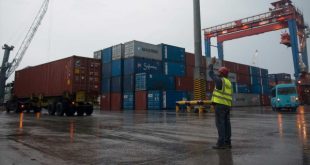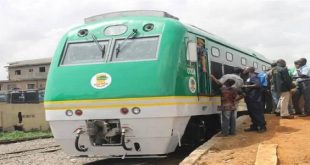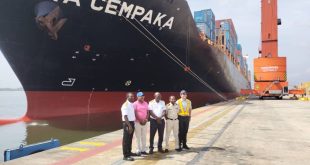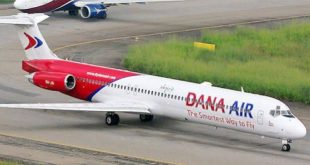By Kenneth Jukpor
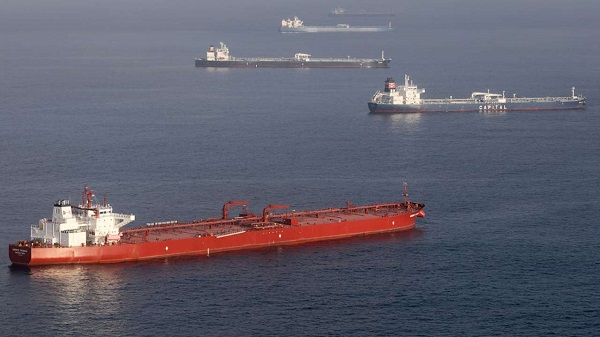
* Why scarcity will continue in Nigeria – Tanker owners
* NIMASA should have impounded MT Nord Gainer – Expert

As Nigeria plans to spend N201billion to clean 170.25milion litres of dirty fuel imported last month, reports have shown that European nations have been dumping toxic fuels in West Africa for more than two decades.
The fact that African countries allow high sulphur content in fuels is the continent’s biggest regulatory failure on fuel specifications. However, it is not the only failure. In Nigeria, the major risks aren’t that fuel specifications are weak or unclear, but the regulators easily compromise.
Speaking with MMS Plus, a Governing Board member of the Nigerian Content Development and Monitoring Board (NCDMB) and Chief Executive Officer of Sopetro Marine Limited, Mr. Mina Oforiokuma lamented that the menace of bad fuel in Nigeria and the entire African continent has been the stock in trade of several European nations.

Oforiokuma, who is also a founding member of Ship Owners Association of Nigeria (SOAN) shared an investigative report by Public Eye which revealed how Europeans take advantage of weak fuel standards in Africa to manufacture cheap and low-quality blendstocks called “African Quality” fuels. These blendstocks are often harmful to both health and the environment.

European and American markets do not accept the use of such low quality blendstocks as fuel ingredients because these blendstocks need further treatment to minimize or eliminate the hazardous substances.
“Some blendstocks, including those that are waste or recycled from the chemical industry, pose additional risks when blended into fuels. For traders, however, these blendstocks are cheap, and they can be profitably used to produce African Quality fuels. Swiss trading companies play a major role in transporting fuel from the Amsterdam-Rotterdam-Antwerp (ARA) and US Gulf regions, West Africa’s two main supply hubs,” the report said.
Around 50 percent of fuel imported to West Africa comes from the ARA region. Some 90 percent of the diesel has sulphur content at least 100 times above the European standard.
Besides selling African Quality fuels at the pump, traders also import dirty blendstocks into African countries for blending with products produced from high-quality African crude. Several African crude oils have the benefits of being both sweet (low in sulphur) and waxy. Examples are the AKPO blend from Nigeria, Cabinda from Angola, and Rabi Light from Gabon.
Deelen, a refinery expert, explains that “many African crude oils are waxy and therefore produce a very high cetane Light Gas Oil making it a very popular blendstock for diesel.” Light Gas Oil can be used directly as diesel fuel; it does not need to be blended. Since many African countries have a lower minimum cetane number, often as low as 45, traders can work to the “fill up quality give away” blending rationale by “filling up” African refined diesel before placing it onto the market.
There is a risk, however, that they are filled up with imports of low cetane blendstocks. Low cetane blendstocks, for example Light Cycle Oil, often contain substances such as sulphur and aromatics, which damage human health.
If a blender has no access to high cetane gasoil blendstocks and still wants to profit from using cheap and low cetane blendstocks, there is always the option of additivation. Cetane improvers such as HFA 3033, supplied by major additive supplier WRT, are widely used additives for diesel. And cetane boosters don’t cost a fortune.
According to the petrolab supervisor, a trader could easily spend US$100,000 or more on cetane improvers for a 30,000 tonne cargo leaving ARA for West Africa: “That looks like a lot of money, but if that allows them to blend in cheap and low cetane blendstocks, it is worth it.”
West Africa produces a significant amount of crude oil, but most of this crude is exported. In 2021, the continent’s biggest producer, Nigeria, refined zero percent of its production. All of its crude production was sent abroad, mostly outside of Africa. Nigeria’s four refineries hardly function and the Dangote refinery represents the biggest hope for indigenous refining anytime soon. This menace is all found in all other significant oil-producing countries in the region except Côte d’Ivoire. So while West Africa is a net exporter of crude oil, it must import petroleum products such as gasoline and diesel.
Nigerian Bonny Light has one of the lowest sulphur content of all crudes (0.15 percent). Even with a simple refinery one can get a higher amount of ultra-low sulphur diesel (10 ppm) than from other grades of crude. In 2014, Europe received 45.82 percent of Nigeria’s exports. The Netherlands alone bought 13 percent of Nigeria’s total exports. The country’s Bonny Light in particular went mainly to Europe, according to an analyst from Platts.
Experts have also described the Nigerian National Petroleum Company (NNPC) Limited’s proposal to spend N201billion to manage the contaminated fuel as a wrong approach, labeling the decision as “a ruse and corruption fuel.”
Speaking with MMS Plus newspaper, a former Executive Director of the Nigerian Maritime Administration and Safety Agency (NIMASA), said “the fuel was imported on CIF (Cost Insurance and Freight); as opposed to FOB (Free On Board). On CIF, matters of the current nature are to be taken care of by their insurance company. Nigeria is not to spend a dime.”
He argued that maritime legal veterans like Chief Olisa Agbakoba should not allow the NNPC GMD, Mele Kyari to deceive, and plunder the economy.
“It’s not enough to apologize for the monumental mistake, he should step aside, resign as you posited. As for cleaning the fuel, the seller should not only refund our money, he should bring in vessels of adequate capacity and in Class to evacuate all their toxic fuel back to their country of origin.”
“Nigeria should also claim from the insurance companies for the transaction on CIF, compensation for those whose cars and petrol generators were completely damaged. All the vessels should be impounded by NIMASA for their criminal breach and tried. If convicted, auction these vessels to Nigerian ship-owners. Cleaning fuel tanks is part of our training and if we win as I know we will, those who succeed in the auction can do the cleaning here with competent supervision of NIMASA expert mariners,” the shipping expert said.
Recently, the NIMASA Director General, Dr. Bashir Jamoh revealed that the agency is in partnership with the International Maritime Organization (IMO) for compensation of the victims of the FPSO Trinity Spirit explosion, however, the NIMASA boss hasn’t commented on the quagmire with contaminated fuel.
While some other analysts have argued that NIMASA would have been unable to impound the vessel, Motor Tanker (MT) Nord Gainer because it didn’t breach its commercial contract which was to deliver the products, others argue that under Cost, Insurance, and Freight (CIF) which governs Nigeria’s imports, the seller must deliver goods that met the buyer’s specified standards.
According to the CIF trade contract, the risk of loss of or damage to the goods passes when the goods are on board the vessel. The seller must contract for and pay the costs and freight necessary to bring the goods to the named port of destination. The seller also contracts for insurance cover against the buyer’s risk of loss of or damage to the goods during the carriage. The buyer should note that under CIF, the seller is required to obtain insurance only on minimum cover.
Meanwhile, moves to detain or sanction the ship, Nord Gainer also known as LA DIGUE, may be too late as it has long sailed away from Nigerian shores. Its coordinates last week was at North East Atlantic Ocean (coordinates 35.96777 N / 6.07471 W) reported by AIS. The vessel is en route to the port of New York, United States (USA), sailing at a speed of 13.4 knots and expected to arrive there on March 9, 19:00.
With the vessel gone, the chances of the regulators NIMASA and NNPC taking actions against the international trader Litasco and its ship appears very bleak, but this may prove another case of regulatory negligence.
In another development, the Executive Secretary of Nigerian Association of Road Transport Owners (NARTO), Mr. Aloga Ogbogo has highlighted some challenges confronting tanker owners which have crippled the transportation of petroleum products in the country.
According to Ogbogo, fuel queues at petrol stations and scarcity will continue across the nation as the business of transporting petroleum products has been unproductive for tanker owners.
His words: “Freight rates by tankers that move these petroleum products are determined by the government and the last review of the pricing was done in 2001. It was reviewed based on the consumption of N190/N200 per litre of gas (diesel), but the price per litre has moved from N200 to over N400. It’s no longer profitable for any tanker to practice this business”
Although he noted that the federal government is engaging tanker owners on new pricing templates, he also lamented that foreign exchange issues have led to increase in spare parts of trucks and there is no fiscal incentive for the operators.
 MMS PLUS NG – Maritime, Aviation, Business, Oil and Gas News Online Newspaper with coverage in Maritime, Oil and Gas, Aviation, Power and Energy as well as Financial News
MMS PLUS NG – Maritime, Aviation, Business, Oil and Gas News Online Newspaper with coverage in Maritime, Oil and Gas, Aviation, Power and Energy as well as Financial News



